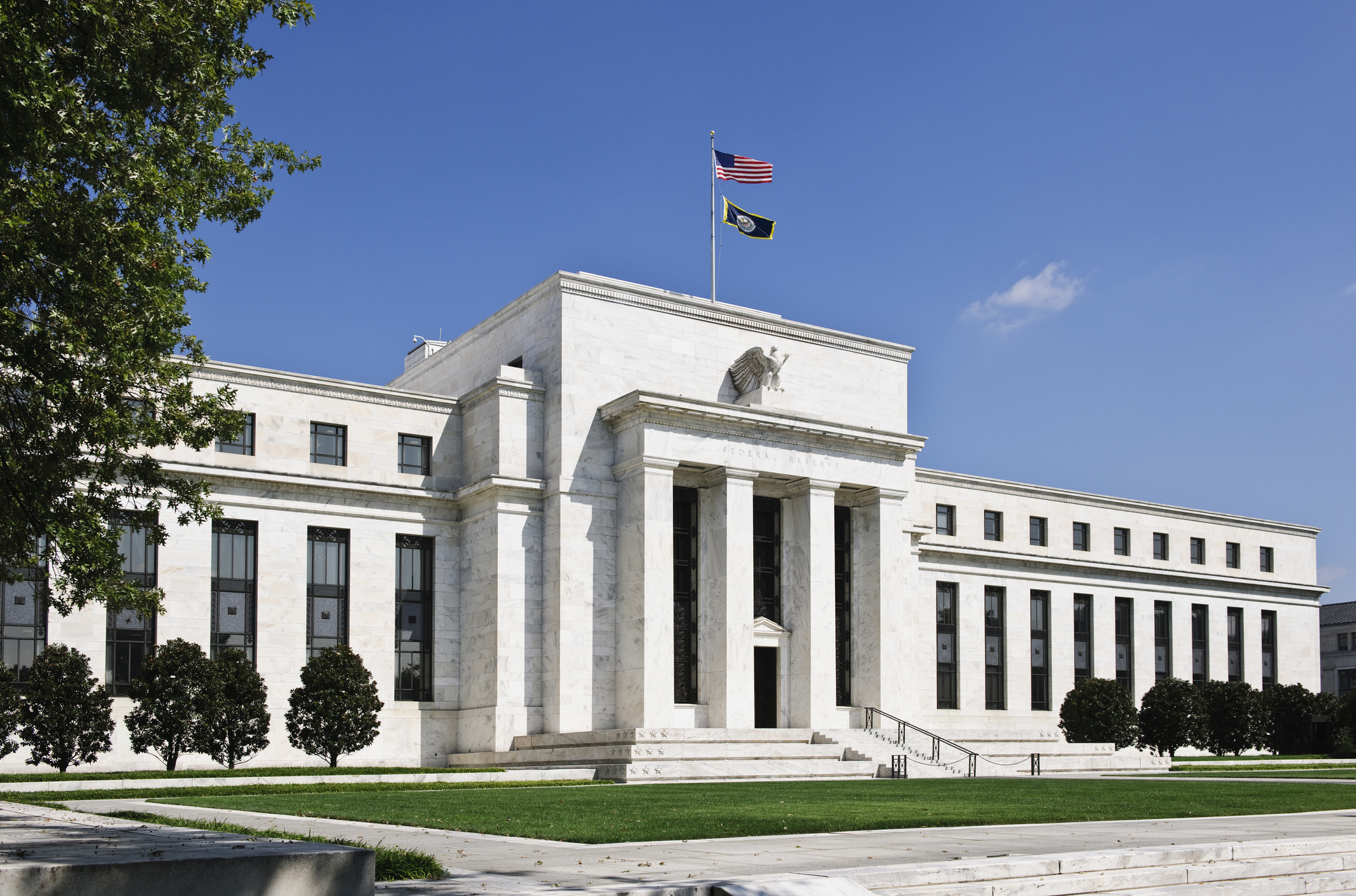Why This Economist Thinks the Fed Is Already Late to Cut Rates
Moody's Analytics chief economist Mark Zandi has some ideas for Jerome Powell.


Profit and prosper with the best of Kiplinger's advice on investing, taxes, retirement, personal finance and much more. Delivered daily. Enter your email in the box and click Sign Me Up.
You are now subscribed
Your newsletter sign-up was successful
Want to add more newsletters?

Delivered daily
Kiplinger Today
Profit and prosper with the best of Kiplinger's advice on investing, taxes, retirement, personal finance and much more delivered daily. Smart money moves start here.

Sent five days a week
Kiplinger A Step Ahead
Get practical help to make better financial decisions in your everyday life, from spending to savings on top deals.

Delivered daily
Kiplinger Closing Bell
Get today's biggest financial and investing headlines delivered to your inbox every day the U.S. stock market is open.

Sent twice a week
Kiplinger Adviser Intel
Financial pros across the country share best practices and fresh tactics to preserve and grow your wealth.

Delivered weekly
Kiplinger Tax Tips
Trim your federal and state tax bills with practical tax-planning and tax-cutting strategies.

Sent twice a week
Kiplinger Retirement Tips
Your twice-a-week guide to planning and enjoying a financially secure and richly rewarding retirement

Sent bimonthly.
Kiplinger Adviser Angle
Insights for advisers, wealth managers and other financial professionals.

Sent twice a week
Kiplinger Investing Weekly
Your twice-a-week roundup of promising stocks, funds, companies and industries you should consider, ones you should avoid, and why.

Sent weekly for six weeks
Kiplinger Invest for Retirement
Your step-by-step six-part series on how to invest for retirement, from devising a successful strategy to exactly which investments to choose.
As the next Federal Reserve meeting approaches, many are waiting in anticipation to learn how the Federal Reserve is going to approach the federal funds rate, particularly as we get into the fall. If cut, lower interest rates are expected to have seismic ripple effects on the rest of the economy, potentially boosting stock prices and kicking the housing market into a frenzy.
For one economist, a rate cut couldn't come soon enough — and it might even be overdue, he argues, based on how the Fed looks at inflation to make decisions. Mark Zandi, chief economist at Moody's Analytics, says the Federal Reserve uses a flawed benchmark to analyze inflation trends, which could affect how the department decides whether or not to cut rates.
Here, Zandi talks to Kiplinger about what he thinks the Fed gets wrong on inflation, what he'd like them to do instead, and what he predicts will happen going forward.
From just $107.88 $24.99 for Kiplinger Personal Finance
Become a smarter, better informed investor. Subscribe from just $107.88 $24.99, plus get up to 4 Special Issues

Sign up for Kiplinger’s Free Newsletters
Profit and prosper with the best of expert advice on investing, taxes, retirement, personal finance and more - straight to your e-mail.
Profit and prosper with the best of expert advice - straight to your e-mail.
KIPLINGER: You’ve said the Fed is using the wrong gauge for inflation and targeting the wrong level. What do you mean, and what would you prefer?
ZANDI: The Fed targets 2% inflation as measured by growth in what’s known as the personal consumption expenditures deflator. At the current time, it’s a flawed measure of inflation because it includes something called owners’ equivalent rent. That’s the implicit rental cost of owning your own home — it tries to measure what a homeowner would have to pay in rent to live in their home.
In theory, that sounds great. But in practice, it’s very problematic, in large part because the housing market is upside down. The affordable part of the market is extraordinarily tight, with vacancy rates at record lows and rents strong. The high end of the market is a lot softer, with a lot more supply. Owners’ equivalent rent is hard to measure in all times, and it’s impossible to measure now. In the rest of the world, other statistical agencies don’t even try. They exclude OER because it makes it very difficult to identify underlying inflationary trends.
What measure would you use instead?
If I had to pick a measure, it would be so-called harmonized core PCE — “harmonized” in that it’s measured on the same consistent basis as it’s measured overseas, with the fundamental difference being that it excludes owners’ equivalent rent. It’s used in most developed economies — in Europe, Canada, Australia. And the point is, if you look at inflation on a harmonized basis, we’re at a 2% inflation rate, and we’ve been at 2% for about a year.
Should the Fed just declare victory on inflation now?
If you were at the Federal Reserve looking at harmonized PCE (or the harmonized measure for the consumer price index, which is published by the Bureau of Labor Statistics), you’d say mission accomplished, inflation is back in the bottle. And with the economy at full employment — a 4% unemployment rate — you’d have achieved all your objectives. Now it’s time to bring interest rates down to neutral, neither restraining or supporting economic growth.
So the 2% target for inflation is okay, it’s just on the wrong gauge?
The Fed has told everybody they’re taking inflation down to 2%. To ensure credibility, which is critical for the future, I’d keep the target at 2% for now. You’ve got to maintain that credibility. But once achieved, and once the Fed has normalized interest rates, I’d take a wholesale look at things.
The Fed does evaluate their framework every so often — every five years or so — and the next one’s coming around. At that point, they should think about the target and what measures to use. I’m confident most everyone would say that 2% isn’t the right target. Why one number? Why not a range of 2% to 3%, just to buy a little wiggle room when you need it? Other central banks use 2% to 3% as well; ours wouldn’t be the only one. The number certainly isn’t 2%. That’s too low.
Why too low?
The reason you want to target an inflation rate a bit higher is that if you set it too low, some industries will be suffering deflation. Then, if you’re a businessperson, you have to go back to workers and cut wages. They’ll say no, and then you have to go to layoffs. You want the overall inflation rate to be high enough so that the businesses with the least amount of pricing power are at least at zero.
In the meantime, do you think the Fed should lower rates now?
Right now, the Fed has a target range of 5.25% to 5.5% for the federal funds rate. They — and I think everyone — would say that’s a restraint on growth. And I would ask, Why? Let’s get going! Cut rates, see what’s going on, and maybe three months later cut rates again.
If you buy the argument that the Fed has achieved its goal, they should be normalizing. If they switch to harmonized PCE or harmonized CPI, then it becomes easier to start cutting without losing credibility. I fear they’ve got PTSD. They got it wrong in early 2022 when they took so long to start raising rates, and now they’re going to err on the other side and take too long to cut rates.
Why do we need a rate cut at all if the economy is as strong as it looks?
I think the economy is strong and resilient. But why take a chance with rates that are restraining the economy? Things happen. Last year’s banking crisis is a case in point. What else is out there that might break that we don’t know about? I don’t feel like there are cracks out there now, but why take the risk?
How rare is it for a central bank to achieve victory on the inflation front without forcing the economy into recession?
It’s rare. There was one recent example in the late 1990s, although it’s not in the same ballpark. Alan Greenspan was the Fed chair; inflation was becoming an issue, and he stepped on the brakes. But he got a lot of help from the productivity boom that resulted from the internet coming on, and inflation then was very modest compared with what we suffered in the wake of the pandemic.
Where do you see the Fed’s target rate ending up?
I forecast a lot of things. Some things I’m not so confident about, and some things I am. I’m very confident about inflation coming down. My sense is the Fed will have enough evidence by the September meeting, and they’ll start cutting a quarter-point once each quarter, and that will get us back close to neutral by the end of 2025 or early-to-mid 2026. If nothing major takes us off-script, that’s the path forward. A neutral rate is probably around 4%, and it’ll probably migrate lower to settle in mid 2026 at 3%, 3.25% or 3.5%, something like that.
Note: This item first appeared in Kiplinger Personal Finance Magazine, a monthly, trustworthy source of advice and guidance. Subscribe to help you make more money and keep more of the money you make here.
Related content
Profit and prosper with the best of Kiplinger's advice on investing, taxes, retirement, personal finance and much more. Delivered daily. Enter your email in the box and click Sign Me Up.

Anne Kates Smith brings Wall Street to Main Street, with decades of experience covering investments and personal finance for real people trying to navigate fast-changing markets, preserve financial security or plan for the future. She oversees the magazine's investing coverage, authors Kiplinger’s biannual stock-market outlooks and writes the "Your Mind and Your Money" column, a take on behavioral finance and how investors can get out of their own way. Smith began her journalism career as a writer and columnist for USA Today. Prior to joining Kiplinger, she was a senior editor at U.S. News & World Report and a contributing columnist for TheStreet. Smith is a graduate of St. John's College in Annapolis, Md., the third-oldest college in America.
-
 The Cost of Leaving Your Money in a Low-Rate Account
The Cost of Leaving Your Money in a Low-Rate AccountWhy parking your cash in low-yield accounts could be costing you, and smarter alternatives that preserve liquidity while boosting returns.
-
 I want to sell our beach house to retire now, but my wife wants to keep it.
I want to sell our beach house to retire now, but my wife wants to keep it.I want to sell the $610K vacation home and retire now, but my wife envisions a beach retirement in 8 years. We asked financial advisers to weigh in.
-
 How to Add a Pet Trust to Your Estate Plan
How to Add a Pet Trust to Your Estate PlanAdding a pet trust to your estate plan can ensure your pets are properly looked after when you're no longer able to care for them. This is how to go about it.
-
 The Cost of Leaving Your Money in a Low-Rate Account
The Cost of Leaving Your Money in a Low-Rate AccountWhy parking your cash in low-yield accounts could be costing you, and smarter alternatives that preserve liquidity while boosting returns.
-
 This Is How You Can Land a Job You'll Love
This Is How You Can Land a Job You'll Love"Work How You Are Wired" leads job seekers on a journey of self-discovery that could help them snag the job of their dreams.
-
 We Inherited $250K: I Want a Second Home, but My Wife Wants to Save for Our Kids' College.
We Inherited $250K: I Want a Second Home, but My Wife Wants to Save for Our Kids' College.He wants a vacation home, but she wants a 529 plan for the kids. Who's right? The experts weigh in.
-
 4 Psychological Tricks to Save More in 2026
4 Psychological Tricks to Save More in 2026Psychology and money are linked. Learn how you can use this to help you save more throughout 2026.
-
 Why Your Home Insurance Might Not Protect You If Someone Else Lives There
Why Your Home Insurance Might Not Protect You If Someone Else Lives ThereLetting a relative stay in a second home or inherited property can quietly change your insurance coverage and leave you exposed to costly liability claims.
-
 My First $1 Million: Retired (at 57) Aerospace Senior Manager, 58, Denver
My First $1 Million: Retired (at 57) Aerospace Senior Manager, 58, Denver"Making $1 million was never a goal, but maybe it should have been. I simply wanted to be debt-free and never worry about money."
-
 5 Best Splurge Cruises for Retirees in 2026
5 Best Splurge Cruises for Retirees in 2026Embrace smaller, luxury ships for exceptional service, dining and amenities. You'll be glad you left the teeming hordes behind.
-
 Have You Aligned Your Tax Strategy With These 5 OBBBA Changes?
Have You Aligned Your Tax Strategy With These 5 OBBBA Changes?Individuals and businesses should work closely with their financial advisers to refine tax strategies this season in light of these five OBBBA changes.